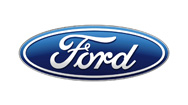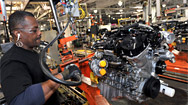Building Supplier Capability through Localized Training and Collaboration
The primary focus of our work on human rights in our supply chain is building capability among our suppliers to responsibly manage working conditions. We began by developing a training curriculum for Ford suppliers in approximately 20 priority countries and surrounding areas. (See Working Conditions Program Focus Countries box below.) Initially, we based the trainings on Ford’s own Code of Basic Working Conditions and implemented them ourselves at our supplier facilities.
We recognized from the outset, however, that a joint effort with other automakers would reach a greater number of suppliers more efficiently – as many of those suppliers are shared across multiple automakers – and would ultimately be more successful in embedding a sound approach to working conditions throughout the automotive supply chain. So in 2005, we initiated a work group within the Automotive Industry Action Group (AIAG), and we recruited other automakers in North America, Asia and Europe to participate.
We have since worked with other automakers through the AIAG to develop a set of guidance statements that establish a shared industry voice on key working conditions issues and a training program for industry suppliers. Initially the industry guidance statements and trainings covered child labor, forced labor, freedom of association, harassment and discrimination, health and safety, wages and benefits, and working hours. In 2010, they were expanded to cover business ethics and environmental responsibility.
It should be noted that Ford’s specific expectations in the Ford Code of Human Rights, Basic Working Conditions and Corporate Responsibility for child labor exceed the expectations in the industry guidance statements and also include elements not yet addressed by the industry guidance statements, such as community engagement and indigenous populations.
Supplier Training Program
Most of our supplier training is now implemented through the AIAG in conjunction with other automakers. In 2012, we expanded the content of these AIAG-led trainings to include ethical business practices and environmental responsibility, in addition to human rights and working conditions. We continue to supplement AIAG-led trainings done in conjunction with other automakers with Ford-specific workshops as needed.
Where Trainings Occur
Beginning in 2007, the sponsoring OEMs launched joint factory-level training workshops in China and Mexico. We have added locations since that time. To date, the expanded trainings have been implemented in Argentina, Brazil, China, Mexico, Romania, Russia, Thailand, Turkey and Venezuela.
Locations for trainings are chosen through discussion and agreement by the AIAG member companies. The launch of each series of in-country trainings involves participation by OEM representatives and Tier 1 suppliers as well as local industry associations and government support where possible. At Ford, we develop our recommendations for training locations with a focus on the 20 countries and regions we have identified as having higher risks of substandard working conditions (see Working Conditions Program Focus Countries box below). Among those countries, we prioritize our recommendations for training locations based on production and sourcing trends, sales trends and relative perceived risk based on the input of human rights groups, other companies’ experience and other geopolitical analysis. We periodically review our list of priority countries in comparison with our global sourcing footprint. We did not find it necessary to add countries in the most recent review.
What Training Sessions Include
Training sessions are customized to align with the unique laws, customs, cultures and needs of each location. Generally, the following working conditions and environmental responsibility issues are addressed:
- Harassment and discrimination
- Health and safety
- Wages and benefits
- Working hours
- Child labor
- Forced labor
- Freedom of association
- Key areas of environmental responsibility, including energy and greenhouse gas emissions, waste, regulatory requirements, environmental testing, and employee, subcontractor and supplier training
- Environmental management systems and continuous improvement
- Environmental performance of products
Training workshops emphasize how these topics are covered in local legal standards, in the industry guidance developed by participating automotive OEMs, and in international best practices. Both the industry guidance and international best practices shared in training sessions may exceed local laws. The trainings also include strategies for developing management systems to ensure compliance in each topic area. And, they address the business benefits of promoting social and environmental responsibility, including protecting and enhancing brand reputation, improving quality and productivity, and avoiding costs associated with employee turnover, absenteeism, injury and illness.
The training sessions are generally day-long interactive workshops facilitated by qualified trainers and involving multiple automotive suppliers. They are structured to provide participants with a solid understanding of customer expectations, local law, best practices and sustainability management systems.
Trainings generally target managers from the human resources, health and safety, and legal departments of participating companies. The sessions use a “train-the-trainer” approach to expand the scope and impact of the training. Participating suppliers are required to cascade the information they learn to management and all personnel within their own company as well as to their direct suppliers. Ford requires confirmation that information was shared within four months of the training session.
In 2010, the automakers collaborating at the AIAG launched an online training program on supply chain working conditions and responsible procurement targeted at purchasing and supply chain management professionals. This web-based training is offered free of charge to suppliers of the five OEMs participating in the AIAG training program. The training has also been deployed internally at a number of the sponsoring OEMs for their own global purchasing and supply chain staffs.
2012 Trainings Completed
In 2012, all Ford trainings were joint industry trainings coordinated through the AIAG. These trainings included both in-person classroom training sessions and e-learning trainings. The AIAG held classroom training sessions in Argentina, China, Mexico, Russia, Thailand, Turkey and Venezuela. More than 325 Ford suppliers attended these classroom sessions.
This brings the global total for trained Ford suppliers to nearly 2,100. (This figure includes dedicated Ford supplier training sessions conducted with the AIAG as well as industry training sessions in which Ford participated along with the AIAG and other automakers.) Because attendees are required to subsequently cascade the training and expectations to the entire factory population and suppliers, these trainings indirectly reach even more companies and individuals. Through this cascading process, the training of suppliers globally since the inception of the program has impacted more than 2,700 supplier representatives, who in turn have cascaded the training information to nearly 25,000 supplier managers and more than 430,000 individual workers as well as nearly 85,000 sub-tier supplier companies.
Suppliers trained in 2012 have now moved on to the process of self-assessing their facilities for compliance with local law and Ford expectations and communicating expectations to their own workers and their suppliers.
In 2013 we plan to conduct additional supplier training sessions in conjunction with the AIAG in Brazil, Mexico, Romania, South Africa and Turkey. Where possible, these courses will be open to any interested company; thus Tier 1 suppliers will have the option of asking their own suppliers to attend. The intent is, once again, to increase the scope of impact of the training and push working conditions expectations further down the supply chain.
Next Steps in Industry Training
As the AIAG initiatives develop and mature, Ford will maintain a leadership position in our work with the supply chain. We will continue to conduct our own training programs in countries not covered by AIAG programs. We will also seek further opportunities to strategically leverage our audit data and training processes to enhance our overall approach to working conditions and environmental responsibility in the automotive supply chain.
Working Conditions Program Focus Countries
- Americas and Caribbean: Argentina, Brazil, Colombia, Mexico (and Central America region), and Venezuela
- Asia and Africa: China, India, Korea, Malaysia, Morocco, the Philippines, South Africa, Taiwan, Thailand and Vietnam
- Europe: Romania, Russia and Turkey
We have trained nearly 2,100 Ford suppliers since we began our working conditions training program, and this training has been cascaded to more than 430,000 individual workers and nearly 85,000 sub-tier supplier companies










